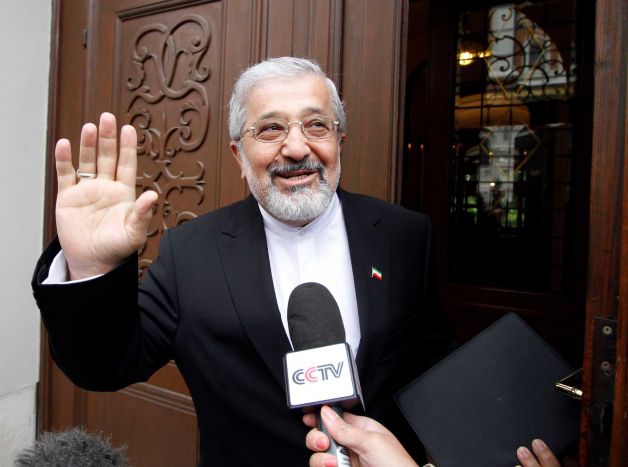The U.N. nuclear agency is forming a special Iran team, drawing together sleuths in weapons technology, intelligence analysis, radiation and other fields of expertise as it seeks to add muscle to a probe of suspicions that Tehran worked secretly on atomic arms, diplomats tell The Associated Press.

Creating a unit focused on only one country is an unusual move for the International Atomic Energy Agency, reflecting the priority the U.N. nuclear watchdog is attaching to Iran amid fears that it is moving closer to the ability to make nuclear weapons. It also indicates frustration by top agency officials over Iranís refusal to cooperate with IAEA experts who are trying to follow up on suspicions that Tehran was ó or is ó secretly working on an arms program.
Iran says such allegations are based on evidence fabricated by the United States and Israel and insists its nuclear program is meant only for making reactor fuel, medical isotopes and peaceful research. But it refuses to give up uranium enrichment, which can produce both reactor fuel and the core of nuclear warheads, despite offers of fuel from abroad. And its stonewalling of the IAEA probe has increased concerns that it has something to hide.
The agencyís move comes at a crucial time. With both the agency and international diplomatic efforts stalemated in attempts to engage the Islamic Republic on its nuclear program, fears are growing that tensions could spill over into armed conflict.
Israeli leaders have been loudly expressing impatience over Western diplomatic and economic moves to deter Iran and increasingly talk of attacking its nuclear facilities, though some analysts believe the saber-rattling is a bluff to increase pressure on Tehran. Iranian leaders have rejected Israelís warnings, threatening punishing retaliation.
The four diplomats, who demanded anonymity because they were not authorized to discuss the restructuring plans, spoke ahead of a renewed attempt Friday by the agency to breach Iranian resistance to its requests for access to sites, documents and people linked to the suspected secret weapons-related work.
One of diplomats likened the restructuring plan to the agencyís Iraq ďAction TeamĒ ó the squad of experts who uncovered components of Saddam Husseinís fledgling nuclear-weapons program in the 1990s.
That unit, however, had broad on-the-ground access under U.N-mandated inspections. Thatís lacking in the case of Iran, which allows agency inspectors access only to its known nuclear activities and has for years blocked its attempts to probe alleged evidence of secret nuclear weapons research and development.
Asked for reaction on the IAEA plans, Ali Asghar Soltanieh, Iranís envoy to the IAEA, said: ďI have not heard of such a thing, and I cannot comment.Ē IAEA spokeswoman Gill Tudor said the agency had no immediate comment.
Danny Danon, deputy speaker of the Israeli Knesset and a member of Prime Minister Benyamin Netanyahuís Likud party, told the AP in a phone interview Thursday that Israel was ďpreparing for all scenarios.Ē He also was dismissive of the agencyís new Iran squad.
ďWe are getting close to the point where the window of opportunity will be closed to us, and thatís why you hear all those voices,Ē he said when asked about the war rhetoric. ďWe have seen too many teams, too many summits, too much talk. It is about time to take action.Ē
Instead of focusing only one country, agency experts up to now have been tasked with following dozens of nations as they look for signs indicating secret attempts to make nuclear weapons.
Some IAEA officials feel that means that they often spend an inordinate amount of time monitoring countries that are unlikely to engage in such activities ó Western European nations for instance ó meaning that not enough attention is paid to potential proliferators.
Under the planned reorganization, said one of the diplomats, a ďdedicated teamĒ of about 20 experts will be drawn from the main IAEA pool to focus solely on the agencyís Iran investigation.
The United States and other nations on the IAEAís 35-nation board that are suspicious of Tehranís nuclear activity are expected to welcome the move.
But two of the diplomats spoke of opposition by board member Russia, which has supported diplomatic efforts to nudge Iran toward a nuclear compromise while strongly opposing harsh sanctions as a means of achieving that goal.
They said senior agency officials had met recently with ranking Russian representatives in efforts to dispel Moscowís fears that the reorganization would place too much weight on intelligence gathering ó an agency function viewed with suspicion by the Russians.
At the Friday meeting, senior IAEA officials are expected to press Iranian representatives for access to a site at the Parchin military complex southeast of Tehran that they suspect was used for nuclear-weapons-linked experiments.
Tehran says a visit is possible only after extensive planning and a detailed outline of procedures. IAEA officials in turn privately describe that caveat as a stalling tactic, citing satellite photos apparently showing a major clean-up effort at the site.
Iran has repeatedly turned down IAEA requests for access and agency chief Yukiya Amano was downbeat ahead of Fridayís talks.
ďI cannot say that I am optimistic about the outcome of the coming meeting,Ē he told reporters in Helsinki, Finland, on Wednesday. ďI cannot say when we can reach agreement.Ē
The Iran Project is not responsible for the content of quoted articles.











